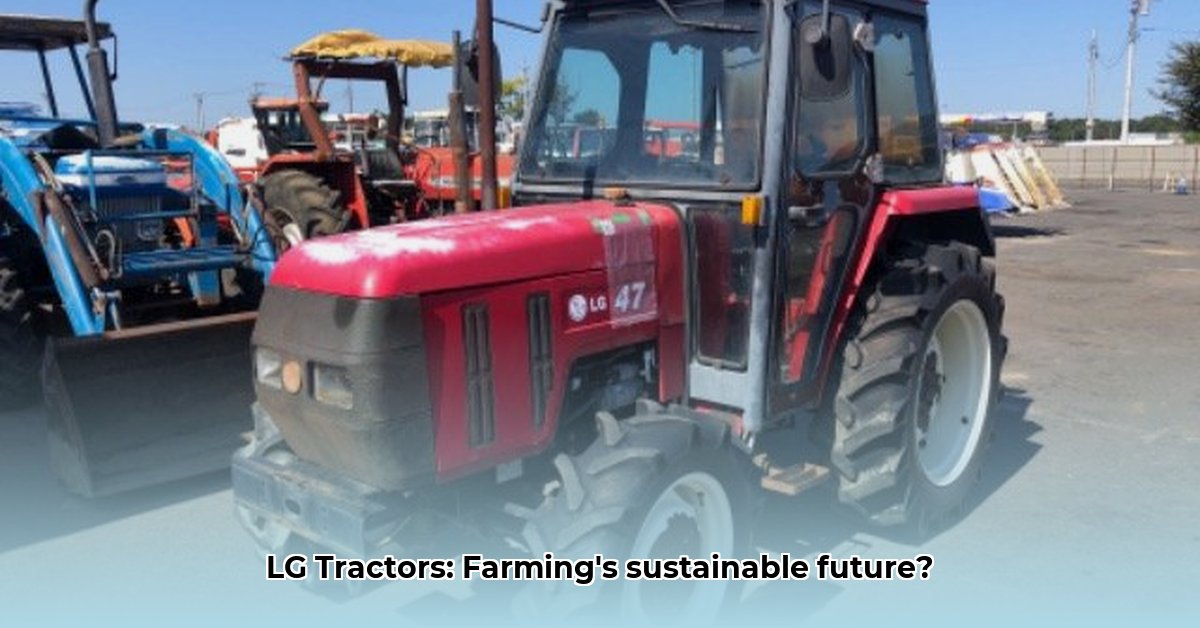
LG tractors, now known as LS Tractor, are not simply building machines; they are actively shaping the future of sustainable agriculture. For decades, LS Tractor has been a leader in innovation, collaborating with industry giants like Yanmar and Mitsubishi to bring cutting-edge technology to farms worldwide. This legacy of partnership and continuous improvement is precisely what makes their latest offering, the MT2 series, so groundbreaking. Learn more about other innovative tractor models like Kubota tractors.
A Legacy of Innovation: From Powerhouses to Eco-Champions
The evolution of tractors mirrors the evolution of agricultural practices—from large, fuel-guzzling machines to the sleek, efficient models of today. LS Tractor has been instrumental in this transformation. Early models prioritized sheer power, focusing solely on maximizing output. However, growing global concerns about environmental impact and fuel efficiency spurred LS Tractor to reimagine their approach. This commitment to adapting to evolving needs is what fuels their current innovations and positions them for the future.
The MT2 Series: More Than Just a Tractor Upgrade
The MT2 and MT2E tractors signify a paradigm shift in sustainable agriculture. These are not incremental improvements; they represent a fundamental change in how farming is approached. The enhanced lifting capacity immediately boosts productivity, allowing farmers to handle heavier loads with greater ease. But the enhanced capabilities are only the beginning.
These tractors incorporate advanced technologies designed to significantly reduce fuel consumption and emissions. While comprehensive long-term data is still being collected to fully quantify the savings, initial findings suggest a dramatically smaller carbon footprint compared to previous models. This translates to a win-win scenario: increased yields coupled with minimized environmental impact.
Sustainability in the Field: The Numbers Tell the Story (Eventually)
The MT2 series’ core focus is sustainability, but assertions require empirical evidence. Independent research is crucial to precisely quantify fuel and emission reductions achieved by these tractors. This isn't merely about marketing; it's about providing farmers with the reliable data needed for informed decision-making. Furthermore, a comprehensive lifecycle assessment (LCA) – from manufacturing to disposal – is vital for a complete understanding of the environmental impact. This transparency is paramount for building trust and demonstrating LS Tractor's commitment to sustainability.
Real Benefits for Real Farmers: Making a Difference on the Bottom Line
The MT2 series offers tangible advantages for farmers. Increased efficiency translates directly into higher productivity and greater profits. However, the benefits extend beyond immediate financial returns. A sustainable farming operation enhances a farm's reputation, appealing to consumers and businesses increasingly prioritizing environmentally responsible practices. This can open doors to new markets and enhance long-term profitability. Investing in an MT2 is an investment in the farm's future.
A Glimpse into the Future: Where Farming is Headed
LS Tractor, through the MT2 series, demonstrates a clear path towards a sustainable agricultural future. This is not a final destination, but an ongoing journey of innovation. We can anticipate even more advanced developments, including electric or hybrid models and sophisticated AI-powered automation for precision farming. Technology will continue to drive agricultural progress, and LS Tractor's commitment places them at the forefront of this evolution. Isn't it remarkable how technology can improve both efficiency and sustainability?
Working Together: Actionable Steps for Everyone Involved
The success of sustainable farming with the MT2 series requires a collaborative approach:
LS Tractor/OEMs: Continuously collect user feedback and incorporate this data into ongoing design improvements. Develop future models incorporating even more sophisticated sustainability features.
Farmers/Producers: Thoroughly evaluate the MT2 series through pilot programs and analyze the return on investment (ROI). Invest in employee training to optimize the use of new technologies and sustainable farming practices.
Government/Regulators: Implement financial incentives for adopting sustainable technologies and create transparent environmental regulations. Set ambitious emission reduction targets and actively support farmers' transitions to new technologies.
Understanding the Risks: Challenges and Solutions
Even the most promising innovations face obstacles. Careful consideration of potential challenges and proactive mitigation strategies is crucial:
MT2 Technology Issues: Risk is low; impact is medium. Mitigation involves rigorous testing, ongoing user feedback, and stringent quality control.
Supply Chain Problems: Risk is moderate; impact is high. Mitigation involves diversifying sourcing of components and securing crucial parts to avoid disruptions.
Farmer Adoption Rate: Risk is moderate; impact is medium. Mitigation necessitates targeted marketing campaigns and attractive financial incentives.
Shifting Regulations: Risk is low; impact is high. Mitigation involves constant monitoring of regulatory changes and adapting proactively to remain compliant.
The future of food production is inextricably linked to technological advancements. LS Tractor's commitment to innovation and sustainability positions them as a vital player in shaping this future. The MT2 series is more than just a tractor; it's a tangible embodiment of progress towards a truly sustainable agricultural landscape. How can we further accelerate this transition?